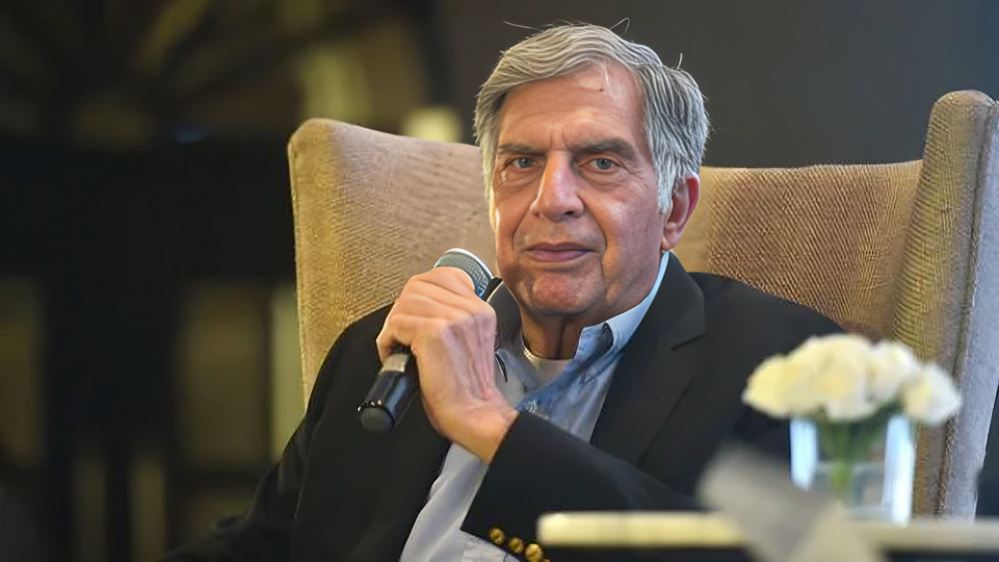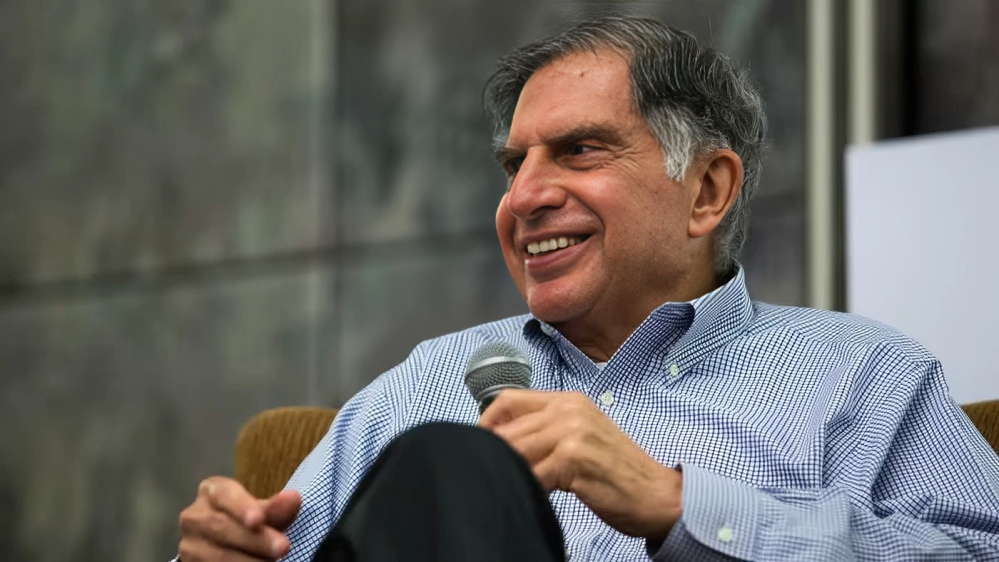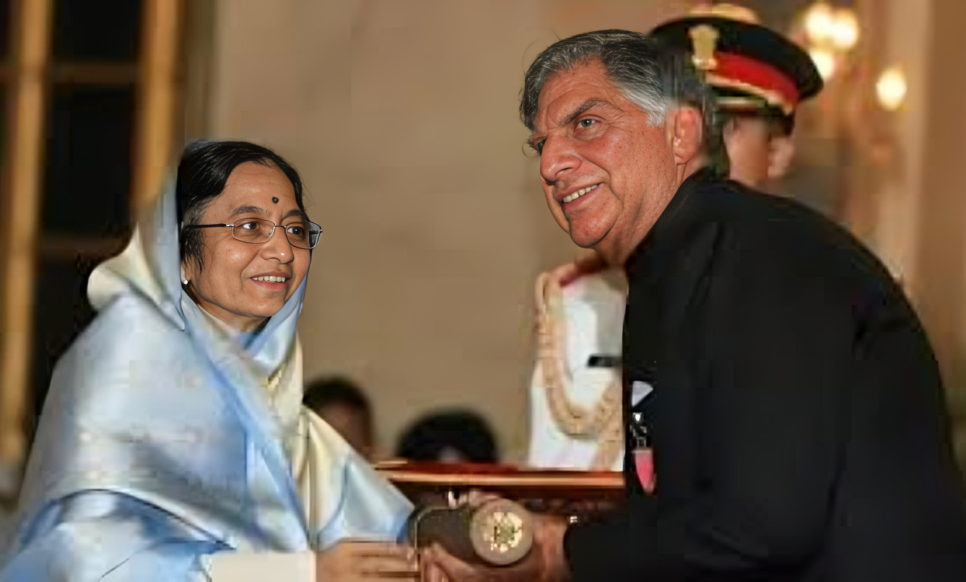Before diving into the inspiring journey of Ratan Tata, it’s essential to understand the profound impact this visionary leader has had on the global business stage and beyond. His story is not just about expanding a business empire, but about redefining what it means to lead with integrity, purpose, and a deep sense of social responsibility. From steering the Tata Group to international prominence to championing philanthropy, Ratan Tata’s legacy serves as a powerful example of how ethical leadership can drive both corporate success and societal progress.

Introduction
Ratan Tata, one of India’s most respected and visionary leaders, has left an indelible mark on the global business landscape. As the former Chairman of Tata Sons, he transformed the Tata Group from a primarily India-focused entity into a global powerhouse, renowned for its ethical practices, social consciousness, and bold acquisitions. Under his leadership, the group acquired globally recognized brands like Tetley, Jaguar Land Rover, and Corus, positioning Tata as a symbol of India’s growing influence in international markets.
However, Ratan Tata’s legacy goes far beyond boardrooms and balance sheets. His leadership was defined not just by financial success but by a deep commitment to social responsibility. As a philanthropist, he channeled vast resources toward causes such as education, healthcare, and rural development, profoundly impacting millions of lives through the Tata Trusts.
Known for his humility, integrity, and hands-on approach, Ratan Tata has set a benchmark for ethical leadership and corporate governance. He remains a figure of inspiration not only for entrepreneurs and business leaders but for anyone who believes that businesses should be a force for good. His life’s work exemplifies a unique blend of visionary leadership, business acumen, and a heart dedicated to uplifting society.
Early Life and Education
Ratan Tata was born on December 28, 1937, in Bombay (now Mumbai), into the esteemed Tata family, which had already made significant contributions to India’s industrial development. Following the separation of his parents, Ratan and his younger brother, Jimmy, were raised by their grandmother, Lady Navajbai Tata, whose influence shaped much of his early values.
Tata’s education began in India, but his higher studies took him to the United States. He earned a degree in architecture from Cornell University and later completed the Advanced Management Program at Harvard Business School. His exposure to Western education, combined with his Indian roots, would later influence his global vision for the Tata Group.
Entry into the Tata Group
Ratan Tata entered the Tata Group in 1962, starting at the very bottom, working on the shop floor of Tata Steel in Jamshedpur. This hands-on experience, which included shoveling limestone and working alongside blue-collar workers, shaped his understanding of the business and his respect for employees at all levels. He gradually rose through the ranks, learning the intricacies of various Tata companies and gaining valuable insights into the group’s functioning.
Leadership of the Tata Group
In 1991, Ratan Tata took over as Chairman of Tata Sons, succeeding J.R.D. Tata. This transition marked the beginning of a new era for the Tata Group. Under his leadership, Tata shifted from being a largely India-centric company to becoming a global player. His strategic vision led to several high-profile acquisitions, including the purchase of Tetley Tea in 2000, Corus Steel in 2007, and Jaguar Land Rover in 2008. These acquisitions not only expanded Tata’s global footprint but also reflected Ratan Tata’s belief in bold, transformative moves that positioned India on the global business map.

Key Business Achievements
One of Ratan Tata’s most ambitious projects was the launch of the Tata Nano, the world’s cheapest car, aimed at making vehicle ownership affordable for the masses. Although the project faced challenges and didn’t meet its commercial expectations, it remains a testament to his innovative thinking and desire to create products that improve people’s lives.
Under his leadership, Tata Consultancy Services (TCS) grew to become one of the world’s leading IT services providers. Tata Motors also emerged as a significant global player in the automobile industry, particularly after the acquisition of Jaguar Land Rover, which became a symbol of Tata’s global ambition and business acumen.
Leadership Style and Principles
- Ethical Leadership: Ratan Tata’s leadership was grounded in ethics and values. He believed that businesses should not only focus on profits but also be a force for good in society. He always emphasized the importance of transparency, fairness, and doing the right thing, even when it was not the easiest path. His approach set a high standard for corporate governance within the Tata Group and across Indian business.
- Visionary Global Expansion: Tata’s global expansion was driven by his belief that Indian companies could compete at a global level. His decision to acquire internationally renowned brands like Tetley, Corus, and Jaguar Land Rover showcased his confidence in Tata’s ability to integrate and manage international businesses. These acquisitions also positioned the Tata Group as a global powerhouse.
- People-Centric Approach: Tata’s respect for his employees and their well-being was central to his leadership. He was known for fostering a culture of inclusion and fairness within the Tata Group. His people-first approach extended to the communities where Tata Companies operated, ensuring that the group’s growth also contributed to societal development.
- Risk-Taking and Innovation: Ratan Tata’s leadership was marked by his willingness to take calculated risks. The Tata Nano project is a prime example, demonstrating his drive for innovation and his desire to create accessible products for all. He also championed innovation within the group, encouraging Tata companies to invest in technology and future-oriented sectors.
- Resilience in Crisis: During the 2008 Mumbai terror attacks, where the Tata-owned Taj Mahal Palace Hotel was targeted, Ratan Tata’s response exemplified his compassionate leadership. He visited the victims’ families, ensured financial and emotional support, and led the hotel’s rebuilding efforts, turning it into a symbol of resilience.
- Humility and Accessibility: Despite his vast success, Ratan Tata remained humble and approachable. He believed in leading by example and often avoided the spotlight, allowing the work of the Tata Group to speak for itself. His open-door policy made him accessible to employees and young entrepreneurs, many of whom see him as a mentor.
Philanthropy and Social Work
Ratan Tata’s commitment to philanthropy is unparalleled. Through the Tata Trusts, he has contributed significantly to education, healthcare, and rural development. The Tata Institute of Social Sciences, Tata Memorial Hospital, and the Indian Institute of Science are just a few examples of the institutions supported by the Tata Group’s philanthropic efforts.
He has also made generous personal donations to institutions like Cornell University and Harvard Business School, supporting initiatives in cancer research, water conservation, and education. His belief in giving back to society is deeply ingrained in the Tata Group’s philosophy of business.
Retirement and Post-Retirement Contributions
Ratan Tata stepped down as Chairman of Tata Sons in 2012, handing over the reins to Cyrus Mistry. However, even in retirement, Tata continues to play an influential role as Chairman Emeritus. He remains actively involved in philanthropy, startup mentorship, and guiding the next generation of leaders. His support for India’s growing startup ecosystem, especially through RNT Associates, has provided a much-needed boost to young entrepreneurs.
Awards and Recognitions
Ratan Tata has been honored with numerous awards, including the Padma Bhushan in 2000 and the Padma Vibhushan in 2008, India’s third and second-highest civilian honors, respectively. His global contributions have also been recognized with honors from various countries and international institutions.
| Award Name | Year | Category/Recognition |
| Padma Bhushan | 2000 | India’s third-highest civilian award |
| Padma Vibhushan | 2008 | India’s second-highest civilian award |
| Honorary Knight Commander of the Order of the British Empire (KBE) | 2009 | Services to UK-India relations |
| Honorary Doctorate (University of Warwick) | N/A | Honorary Doctorate |
| Honorary Doctorate (University of Cambridge) | N/A | Honorary Doctorate |
| Honorary Doctorate (University of New South Wales) | N/A | Honorary Doctorate |
| Carnegie Medal of Philanthropy | 2007 | Philanthropy |
| Business for Peace Award | 2010 | Peace and business contributions |
| Hadrian Award | 2015 | World Monuments Fund |
| Sayaji Ratna Award | 2018 | Contribution to society |

Personal Life
Ratan Tata is known for being a deeply private and reserved individual, traits that stand in contrast to his towering public presence as one of India’s most influential business leaders. Born into the illustrious Tata family, he was raised by his grandmother, Lady Navajbai Tata, following his parents’ separation. This early family dynamic is often credited with shaping his humble and grounded approach to life.
Despite heading the vast Tata Group empire, Tata has always maintained a simple lifestyle, avoiding the ostentatious displays of wealth associated with many in his position. He is widely regarded for his down-to-earth demeanor and approachability, making him relatable to employees at all levels. His interests outside of work include cars, architecture, and flying, all passions that reflect the multifaceted nature of his personality.
Ratan Tata has never married, a decision he attributes to personal circumstances at different points in his life. Instead, he has dedicated much of his time and energy to his work and philanthropic causes, significantly impacting areas such as education, healthcare, and rural development through his leadership of the Tata Trusts. This deep sense of responsibility towards society has been a defining feature of his personal and professional life.
Legacy
Ratan Tata’s legacy transcends his business achievements. He is revered for his integrity, unwavering commitment to ethical business practices, and dedication to the greater good. Under his leadership, the Tata Group transformed into a global conglomerate, becoming synonymous with trust and reliability. His philanthropic endeavors have touched countless lives, focusing on areas such as education, healthcare, and rural development. Beyond his business acumen, his humility and visionary approach continue to inspire generations of entrepreneurs and business leaders. Ratan Tata’s leadership exemplifies a rare combination of corporate success and a profound sense of social responsibility, cementing his status as one of the most respected figures in the business world.
Ratan Tata Passes Away: A Legend Leaves Behind a Lasting Legacy
Ratan Tata, one of India’s most respected business leaders, passed away at 86, leaving behind a legacy that transformed Indian industry. As the former Chairman of the Tata Group, he was instrumental in turning the company into a global powerhouse, known for its ethical practices and innovative ventures. His leadership was marked by iconic acquisitions, including Jaguar Land Rover and Corus Steel.
Beyond business, Ratan Tata was a dedicated philanthropist, channeling resources toward education, healthcare, and social upliftment through the Tata Trusts. His humility, integrity, and commitment to social good made him a beloved figure. His impact will continue to inspire future generations.
Stay tuned to inspire4ward for more updates.



